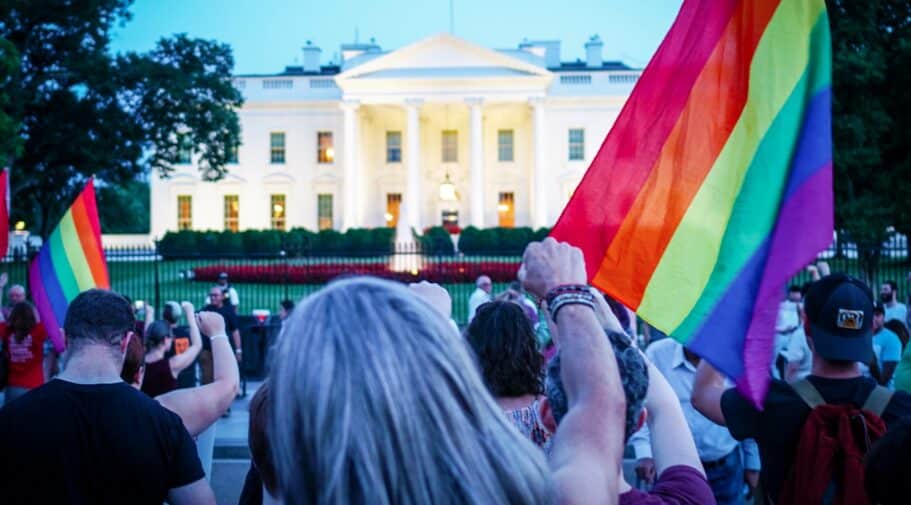

Rob Schofield
“Anyone who is qualified, able to be deployed into war zones and wants to serve should continue to be allowed to do so, including our transgender troops,” says US Republican Senator Susan Collins.
Collins was one of the only Republican Senators to speak out against the homophobic ‘Don’t Ask Don’t Tell’ (DADT) military policy nearly a decade ago. Now, Collins is part of a bipartisan effort to oppose Trump’s ban of transgender people from the US military, which has bounced around the US judicial system since the President’s impromptu announcement of the policy in 2017.
It is an uncomfortable topic for any socialist to approach, defending the right to become a soldier in the most bloodthirsty and rapacious imperial war machine in the world. But now, just as with DADT, it is vitally important that we prevent LGBT+ individuals from being forced out of public life by discriminatory policies that seek to invalidate anyone that dares transgress society’s gender norms.
The current debate can be traced back to the “Lavender Scare” of the 1950s, where President Eisenhower banned anyone with a “sexual perversion” from federal employment. This was part of the McCarthyite anti-communist witch hunts of the era, which sought to demonise anyone not conforming to gender norms as enemies of the state, leading to mass-firings, social castigation and suicide.
Even decades after the LGBT movements of the 1970s had won significant reforms to these rules, up until Obama’s second term, restrictions remained in place disqualifying those from the military with “[c]urrent or history of psychosexual conditions, including but not limited to transsexualism, exhibitionism, transvestism, voyeurism, and other paraphilias”.
The policy used outdated language that medical organisations had stopped recognising decades ago, and its formulation is clearly an attempt to conflate being transgender with mental illness.
In June 2015 at an annual policymaking meeting of its 538 delegate physicians, the American Medical Association passed a resolution opposing the transgender ban, stating that there was “no medically valid reason to exclude transgender individuals from service in the U.S. military”. Yet years after the repeal of DADT, which allowed LGB military personnel to be out in the open, closeted transgender individuals could still be dismissed as soon as they were discovered.
Finally, during the last gasps of the Obama administration in 2016, like a teenager rushing to finish an assignment the day before it is due, the Pentagon moved to overturn the ban. But like much of Obama’s legacy, this would turn out to be a technocratic, transient reform easily washed away by an incoming reactionary government.
Pattern of bigotry
In 2017, Donald Trump tweeted:
“After consultation with my Generals and military experts, please be advised that the United States Government will not accept or allow Transgender individuals to serve in any capacity in the U.S. Military. Our military must be focused on decisive and overwhelming victory and cannot be burdened with the tremendous medical costs and disruption that transgender in the military would entail.”
Trans people who had only just felt empowered to come out were immediately being punished for it by being threatened with dismissal.
This policy followed the same pattern as Trump’s Muslim travel ban, whereby Trump announces an extreme, unconstitutional and clearly discriminatory policy targeted at a minority group, appealing to his reactionary Christian base. His advisors then attempt to force through a slightly sanitised version of the policy that can be passed in the judiciary.
For the Muslim travel ban, the case was made that the ban was not against all Muslims entering the US, but against a list of countries that pose a terror threat, which just so happen to have majority Muslim populations.
In the case of the transgender ban, Trump’s staff claim (contrary to the President’s own words) that not all transgender individuals are targeted, only those who have been diagnosed with “gender dysphoria”, the medical term for when someone experiences a mismatch between their biological sex and gender identity.
This is akin to how the Christian right have used sodomy laws, judicial loophole logic, which avoids discrimination on paper by targeting a single act or characteristic, but in practice, discriminates against an entire minority.
Conclusion
As socialists it is vital that we oppose this ban just as we would oppose a ban on BAME people joining the police. While we heavily criticise the oppression these institutions carry out, barring a minority group from a sector of public life sets precedents and has far-reaching consequences.
This ban must be viewed in the wider context of Trump’s goal to legally define gender as biological and based solely on one’s genitals at birth. We must condemn this discriminatory course of action, which seeks to define transgender people out of existence.
Last month, Democratic presidential primary candidate Kirsten Gillibrand brought transgender Navy officer Blake Dremann to Trump’s State of The Union Address to protest the ban. But if we are to learn anything from history, it is that the Democrats are simply the liberal wing of the capitalist establishment, willing to accommodate transgender rights because they are not an immediate threat to capitalism.
As evidenced by Obama’s years-long dawdling on the issue, the Democrats have no interest in securing meaningful, enduring gains that can’t be wiped out as soon as the reigns of power change hands.
Now more than ever the case must be made for a US workers’ party which can fight for irrevocable trans rights, state-funded healthcare to pay for hormone treatments and surgeries, and address the root cause of gender oppression which is fundamentally based in capitalist class society.
Photo: Protest against Trump’s trans military ban outside The White House, July 2017. Credit: Ted Eytan